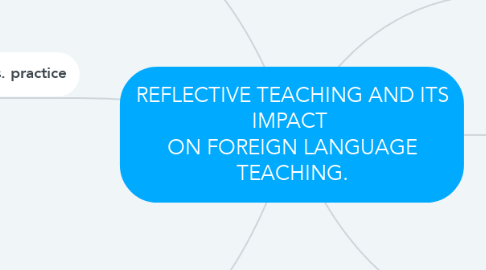REFLECTIVE TEACHING AND ITS IMPACT ON FOREIGN LANGUAGE TEACHING.
by Nini Johanna Schiller


1. a. Received knowledge: (vocabulary of the subject and the matching concepts, research findings, theories, and skills)
1.1. Reflective teaching in foreign language contexts
1.1.1. -language teachers in general need to know about linguistics, education, psychology, and any other field that may affect the teaching/learning process. -Being theoretically illustrated will bridge the gap towards appropriate and efficient ESL/EFL instruction.
2. Theory vs. practice
2.1. The key to effective teaching is definitely a balance between theory and practice. Collin (1996) has said that some practitioners are skeptical about the value of theory and question its relevance, mainly because they do not how to use it.
2.2. we need to demonstrate our research base by conducting our own classrooms research(reflective practWe have to show that we understand the hows and whys of our theory and practice. (p. 57)
2.3. If practitioners are willing to invest time, effort and resources in this type of training, reflective practice can indeed be an effective means for professional growth.
3. Reflective teaching as professional development
3.1. For Wallace (1991) a teacher education course should include two kinds of knowledge for it to be professionally structured:
3.1.1. b. Experiential knowledge: ( developed knowledge-in-action by practice of the profession).
3.2. Suggested procedures for reflective teaching in EFL contexts
3.2.1. Being a reflective practitioner/action researcher demands teaching, thinking back, describing, investigating reasons, discovering new understandings, deciding what to do next (Black, 2001).
